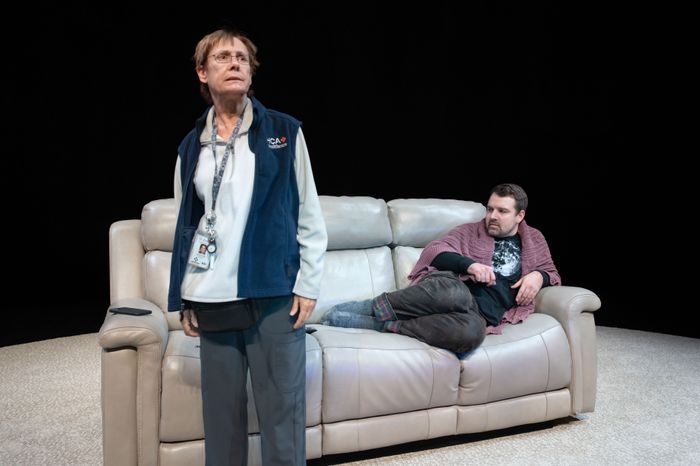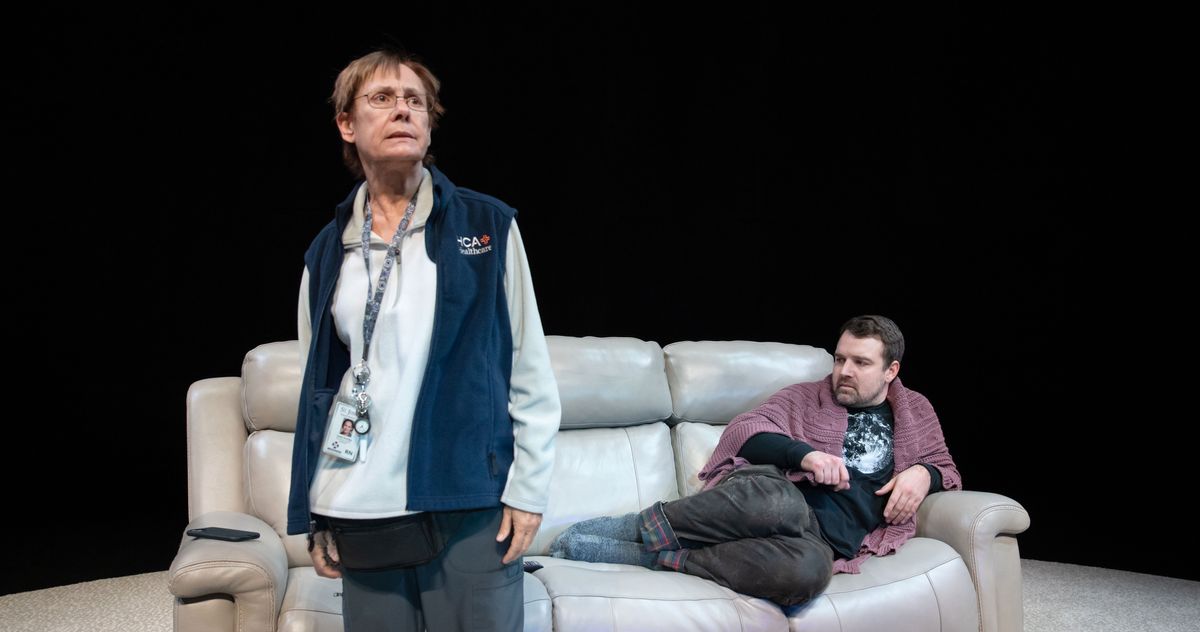
Laurie Metcalf and Micah Stock in Little Bear Ridge Road, at the Booth Theatre.
Photo: Julieta Cervantes
I usually bring along a notebook to scribble in the dark during a play, and even if my notes are almost illegible, they at least help me retain the sense of memory of something that felt important. About a third of the way through Little Bear Ridge RoadI realized I was just writing down words and phrases Laurie Metcalf had hit out of the park: “You need a top sheet!?” “He’s being like this Protestant,” “Home Box Office,” “Bandsaw.” Metcalf is one of America’s great theater stars, and also, a winner of and nominee for a vast number of Emmys. (Remember this?) Give her a nice slow pitch of a line over home plate, and she’ll square her shoulders and whack it with such force you can hear ash colliding with leather. Her style is muscular and visceral—very Steppenwolf, the company where she was a founding member—and you feel a need to supply sound effects as you describe what she’s doing. “All this time you’ve thought I had an issue with you being gay?” (ka-ping!), she tells her nephew, played by Micah Stock, who’s moved into her home in Idaho with her while he arranges his dead father’s affairs. “That’s the most interesting thing about you” (wham, pow!).
In Little Bear Ridge RoadMetcalf racks up the hits with ease, although the production feels more like watching a home run derby than a full game. I couldn’t escape the nagging sensation, as I watched Samuel D. Hunter’s drama unfold, that the circumstances were all arrayed too perfectly for a Metcalf showcase, that they’re too custom-fitted to her skills—that there were diminishing returns to watching her do only what she does best. Is it wrong to wish for more uncertainty, more risk, the presence of another team on the field? Metcalf and her director and frequent collaborator Joe Mantello commissioned this play from Samuel D. Hunter, whose work tends toward exquisite miniatures of his home state of Idaho, often with emotionally desperate queer men at their center. (The play’s producer, Scott Rudin, who stepped away from Broadway in 2020 amid accusations of over-the-top bullying, has alighted on this as the perfect upper middlebrow vehicle for his theatrical comeback.) Here, Hunter returns to a familiar figure in Stock’s Ethan, a writer who made it out of small-town Idaho for college and then a life in Seattle, but whose career is flagging and bank account is running dry. Stock is a bit overwhelmed by Metcalf’s onstage firepower—who wouldn’t be?—though he develops into the part well over the course of the evening, combining an imposing physical presence with fey defensiveness. He’s a grown-up who’s spent so long emphasizing his teddy-bear qualities that he doesn’t know how to get out of the act. After the death of his addict father, Ethan heads back to see if there’s any money to be made from selling his home, intending to stay, only briefly, with his aunt Sarah, Metcalf’s character, a Brunhilde of the high prairie. She values her independence, proudly announces that her truck can hit a deer without leaving much of an impact on the vehicle, and spends much of the play railing against her superiors at her nursing job or watching trashy TV that she insists she hates. The two are uncertain about each other from the start. Ethan initially worries that Sarah is homophobic, but the tension has more to do with his deeper feelings of betrayal about the way she acted during his childhood, and the open wounds that remain from his father’s addiction.
Hunter has set himself a very fine amount of emotional and physical space within which to work, and there’s pleasure in watching Metcalf and Stock negotiate the tiptoeing way Sarah and Ethan grow closer. Scott Pask’s set consists of only a fold-out sofa on a circular platform—”a couch in a void,” the script says—which evokes the surface of the moon, or the face of a stalled timepiece. The two are often talking around each other, avoiding a multitude of painful subjects while watching television, indicated by a blue glow in Heather Gilbert’s lighting that emanates from the direction of the audience, as if we’re all sitting behind the screen. Hunter comes across said that, in addition to writing specifically for Metcalf, he “wanted to write a play about people watching television.” Little Bear Ridge Road does capture many of the strange emotional contours of bingeing a series with someone you can’t connect with emotionally. (The play takes place during the pandemic, and it’s a time capsule.) Sarah and Ethan won’t address their family history, but they will vent with each other about the twists in their preferred drama. Hunter has a lot of rich material to work with, given that staring at a screen is the act that takes up most of our days, and then there’s the added resonance that Metcalf herself, given her years on Roseannethat’s it associated with that couch. In Little Bear Ridge Road‘s best moment, he has screen and life blur together: Sarah, as she helps Ethan sort through the detritus of his father’s home, describes something she saw in an old TV show, a moment where a guy was puttering around the house and suddenly sees a giant hole in his living room (sounds both like David Lynch, and Mad Men by way of LA Law). As Sarah describes it, and Metcalf plays it, television becomes life. She’s suddenly in the living room with that hole too. What we’ve absorbed through popular culture is as wound into our epigenetic memory as anything else.
But Hunter doesn’t push much further from there. In my favorite works of his, like A Case for the Existence of God and A Bright New Boise—a play that has its own surreal dynamic with television screens, which play images of hell in the middle of a big-box store—Hunter locates an unnerving mysticism in between the atoms of the hyper-real. But I worry that Hunter, whose lesser and earlier work The Whale became a successful film, has turned since that film’s release towards a more careful self-awareness that isn’t as rangy and exciting. I felt it in the meta Grangevillewhich included an Idaho miniaturist artist worried about the packaging of his work, and it creeps into Little Bear Ridge Roadwhich doesn’t glimmer with mystery as much as it offers some stern “grow up, turn off your phone” life lessons for Ethan. Sarah might be pleased, I guess, even she gets her way. And while I’m happy to see some intra-medium snobbery, Ethan and Sarah’s engagement with television becomes pat—their favorite show, Extraterrestrialreveals itself to be a grab bag of sci-fi clichés, although it never sounds quite like a real thing that might be airing anywhere. Is an endless network drama like Lost? Did Netflix original mangle? A folly of Apple TV+ expense? Punch down at the boob tube all you want, but punch with accuracy. This way of peering at screen culture from an inaccurate distance, which also comes up in a scolding scene where Ethan scrolls aimlessly through something like TikTok, rankles in a play that is otherwise so precise about physical time and space. You are free to Google the exact location of the real Little Bear Ridge Road, for instance, just outside of Troy, Idaho.
Hunter stretches, too, to weld the play’s interest in the act of watching television to stargazing. That occupies (as long as we’re thinking in TV terms) a B-plot in which Ethan ends up flirting with a local astrophysicist played by John Drea. (They meet on an app, though you would better understand the characters’ expectations if it specified whether it’s akin to Tinder or more like Sniffies.) Their budding romance contains echoes of other Hunter plays—there’s a fight about money very much like the one in Clarkstonand the feeling of a relationship pulled taut by one partner’s stasis, a la Grangeville—yet I found it difficult to connect to. Stock and Drea are charming together, and their flirtation in Mantello’s direction feels like a cozy web comic, but you keep waiting for Hunter to plunge the characters into something deeper than a fight over whether to leave town for a Ph.D. program or a rumination of how looking out at the night sky makes you feel small. Mostly, you’re just waiting for Laurie Metcalf to come back onstage.
Little Bear Ridge Road is at the Booth Theatre.

اترك تعليقاً